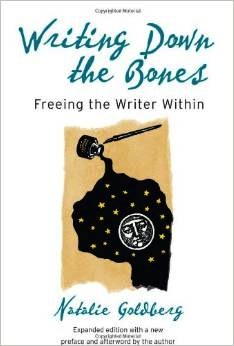Ditch that internal editor and write with courage, thanks to advice from Natalie Goldberg.
When it comes to the tyranny of facing that blank page (or screen) Natalie Goldberg’s got you covered. Not only does she have plenty of writing advice for writers at every level, she delivers that advice with the calm poise of someone who knows — someone who also overcomes that fear, that self-doubt, every time she sits down to write.

Writing Down the Bones: Freeing the Writer Within by Natalie Goldberg
Goldberg recommends “writing practice” to beat writer’s block and to thwart the inner editor who defiles your brain with crippling thoughts such as: You’ll never write anything worth reading. You should just give up. Besides, don’t you need a snack, just now?
The root of writing practice is the timed exercise. If you participated in our recent Writing 101 course, you’ll recall that we like — and use — this advice ourselves:
The basic unit of writing practice is the timed exercise. You may time yourself for ten minutes, twenty minutes, or an hour. It’s up to you. At the beginning you may want to start small and after a week increase your time, or you may want to dive in for an hour the first time. It doesn’t matter. What does matter is that whatever amount of time you choose for that session, you must commit yourself to it and for that full period…Burn through to first thoughts, to that place where energy is unobstructed by social politeness or the internal censor:
- Keep your hand moving. (Don’t pause to reread the line you’ve just written. That’s stalling and trying to get control of what you’re saying.)
- Don’t cross out. (That is editing as you write. Even if you write something you didn’t mean to write, leave it.)
- Don’t worry about spelling, punctuation, grammar. (Don’t even care about staying within the margins and lines on the page.)
- Lose control.
- Don’t think. Don’t get logical.
- Go for the jugular. (If something comes up in your writing that is scary or naked, dive right into it. It probably has lots of energy.)
While some question the utility of writing practice, Goldberg likens writing practice to anything else where the doer strives to become better:
It is odd that we never question the feasibility of a football team practicing long hours for one game; yet in writing we rarely give ourselves the space for practice.
What I love about Goldberg is her reassurances. She’s always there, like a best friend, as a voice of experience, the writerly voice of reason, gently urging you on when you feel like you’re wasting your time:
When you write…sit down with the least expectation of yourself; say, “I am free to write the worst junk in the world.”
Goldberg never judges. She simply asks that we do the work by establishing a consistent practice, trust the process, and try not to be so hard on ourselves.
Currently blogless? You’re a click away from sharing your story.
Create your blog at WordPress.com
I really agree. I taught creative writing courses for a decade. I always recommended Writing Down the Bones by Natalie Goldberg to my students.
LikeLike
Goldberg supercharged my drive to write…her generosity is remarkable.
LikeLike
Kindly visit like and comment this blog Thanks
LikeLike
Hi! Loved what you wrote. Will surely pick up the book.
I recently started blogging myself. It would be great if you could check out my blog and tell me how I could improve http://www.authorsandreaders.wordpress.com
LikeLike